UMMC brings medical services to JSU athletes in new partnership
Published on Monday, October 11, 2021
By: Ruth Cummins
Photos By: Melanie Thortis/ UMMC Communications
The University of Mississippi Medical Center is collaborating with Jackson State University to provide medical services to athletes, a first-time endeavor that brings a variety of UMMC specialists into play with the goal of comprehensive care for all.
That’s in addition to detailed physicals for all athletes performed by Medical Center fellows, residents and attending physicians. They will routinely staff all home and away football games and all home women’s and men’s basketball games. Some other school sports are being staffed, and UMMC providers are available to all of JSU’s 450 athletes.
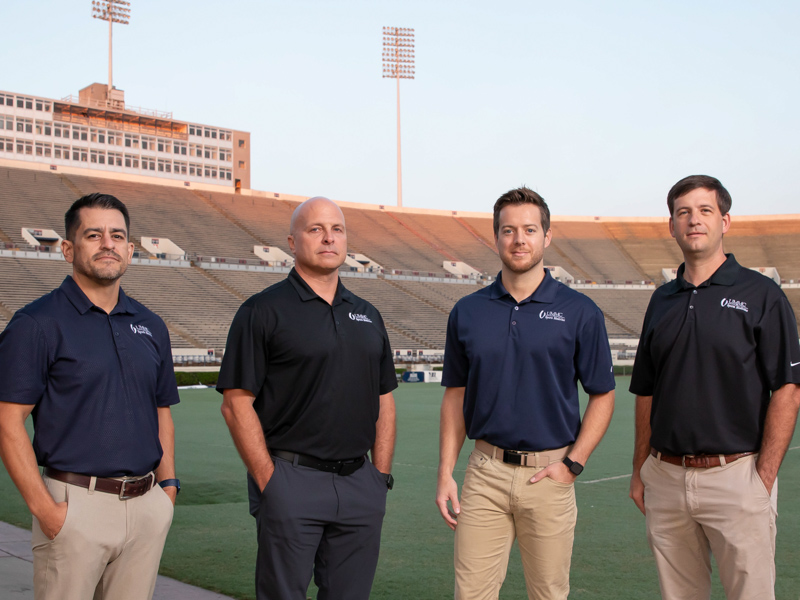
Heading up the program to bring medical services to JSU athletes are, from left, Jeff Martinez, Department of Orthopaedic Surgery and rehabilitation sports medicine supervisor; Dr. Brian Tollefson, professor of emergency medicine; Cody Pannell, assistant professor of physical therapy; and Dr. Jim Hurt, assistant professor of orthopaedic surgery.
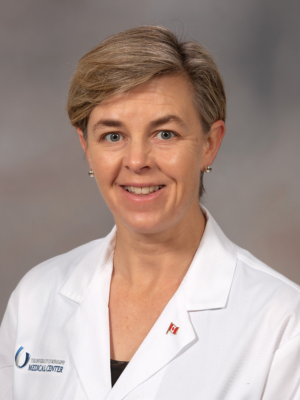 Leitch
Leitch“We believe comprehensive care from UMMC is what the athletes require,” said Dr. Kellie Leitch, associate professor and interim chair of the Department of Orthopaedic Surgery and Rehabilitation. “It’s a great new opportunity for the department, but these athletes also need access to cardiology, ophthalmology and all specialties. Being injured on the field is not just about a broken bone.”
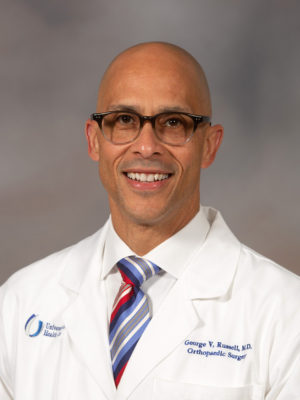 Russell
RussellThe partnership evolved because JSU “was looking for a comprehensive care model for their athletes, and the university system was best suited to help them meet their needs,” said Dr. George Russell, chief executive officer of University Physicians, the Medical Center’s faculty physician practice plan. Russell formerly served as the longtime Orthopaedics chair.
“The typical model is to provide on-the-field injury services, but this model looks at the wholeness of the athletes and their medical, emotional and wellness needs in order for them to perform well,” Russell said.
“The care of our student-athletes is of the highest priority at Jackson State University,” said Ashley Robinson, vice president and director of athletics at JSU. “When a young man or woman comes to campus as a freshman, we are watching over someone’s son, daughter, brother, sister and friend. The care they receive is a part of the student-athlete experience, and I believe we work with the best medical professionals in the country.
“Relationships are resources,” Robinson said. “We value the relationship with UMMC and how it directly leads to a positive impact for our student-athletes.”
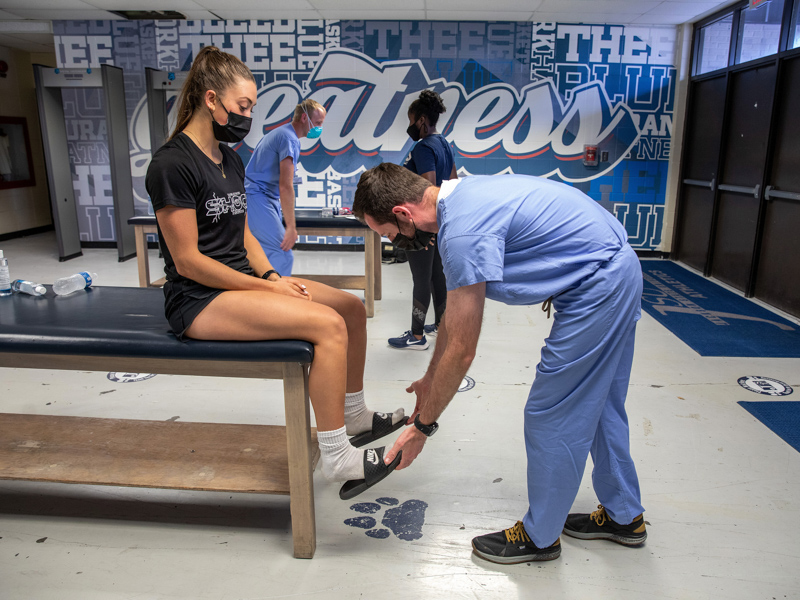
UMMC orthopaedics resident Dr. Steven Greene checks the feet of JSU softball player Rachael Barker of Sashatoon, Canada.
Athletic trainers and residents for some years have staffed a variety of athletic events across the state, but “this is another level of involvement for our trainers and residents,” Leitch said.
JSU offers men’s programs in baseball, basketball, football, cross-country, tennis, track and field, and cheerleading. Women’s programs include basketball, bowling, cross-country, soccer, softball, tennis, track and field, volleyball and cheerleading.
UMMC specialist care is a key part of the JSU partnership. “We will be there for the athletes year round, from the first day of practice in the summer to the last baseball game in the spring,” said Jeff Martinez, Orthopaedic Surgery’s supervisor of sports medicine. “We have access to every Medical Center department, and the Emergency Department will certainly be a big one.”
If a player takes a hard hit to the jaw, for example, he or she might need care from experts at the School of Dentistry. Martinez, as care coordinator and navigator, will get the ball rolling for that student to be seen promptly.
“This single access point, first to Orthopaedics, but then the rest of the university, means parents will know that if their child is injured or has other medical problems, there’s one-stop shopping,” Leitch said.
Physicals for athletes involve Medical Center specialists “who can help more accurately detect issues that could be missed by an orthopaedist, such as a heart murmur,” Russell said, “We’ll be looking at their musculoskeletal system and their cardio system. It’s much more holistic than a typical athlete physical.”
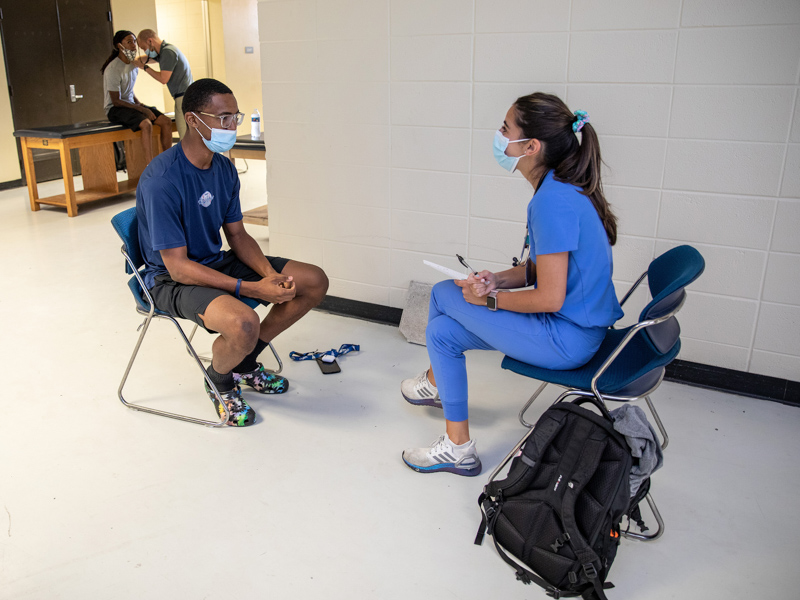
Family Medicine resident Dr. Erika Wachs, right, chats with JSU baseball player Hasan Standifer of Harbor City, California, before he undergoes a physical exam.
If a problem that might be unrelated to sports is discovered, “our commitment is that we will take care of these young people for all medical issues,” Leitch said.
Hannah White, whose sport is women’s track and field, said good medical care is essential for NCAA Division I athletes such as herself. “There is a lot that goes into that, like weight training, nutrition and the day-to-day schedule,” said White, a resident of Chandler, Arizona.
“We need quality care to not only care for injuries, but also prevent injuries from happening.”
Injuries “are part of being an athlete,” said Christian McNair-Jones, an Atlanta resident who takes part in men’s track and field.
In his sport, “hamstring and shin injuries occur often, and it’s important to have a medical provider,” he said.
“There’s a point person in every single department who is willing to see a student that day or the next day, or to quickly get that student into the area where they need to be seen,” said Dr. Jim Hurt, assistant professor of orthopaedic surgery and one of the physicians caring for football players both at home and on the road.
“They need things on a daily basis. We are providing incredibly expedited care that’s more like you’d see on a professional level,” Hurt said. “It’s almost like house calls for their home football games. I’ll check on them Friday night before the game, and then Saturday throughout the game.”
The partnership is mutually beneficial because of the educational component for learners at the state’s only academic medical center, Leitch said. “We can provide comprehensive care, and we have access to these great athletes. We can learn from them, too.”
Orthopaedics has a sports medicine fellowship program in addition to training residents. “They are very involved in the care of the athletes,” Leitch said. “Many orthopaedic residents might enter the field of sports medicine, so this is an opportunity for them to have live, on-the-ground, just-in-time experience with these athletes, and not just with injuries.”
Martinez said the collaboration also could provide research opportunities for Medical Center faculty, much like a concussion study that involved athletes from Mississippi College.
The JSU-UMMC partnership holds promise of future growth and innovation, Hurt said. “This will be a several-year rollout,” he said. “Injury prevention is one of the benefits of UMMC’s involvement. If we can set up programs in the off season to keep athletes from having an injury, that will help keep them out of the OR.”
JSU’s athletes “are inspiring young people, and they are very driven,” Leitch said. “They are very focused, and part of our responsibility is to make sure that they can perform at their best.”
“Our goal is for a student-athlete to leave JSU with a degree, several SWAC championship rings, and healthy and ready to take on the next part of their life,” Robinson said.